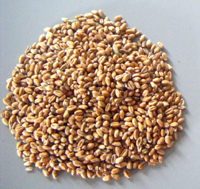Husbandry: Feeding In order to produce good-quality, healthy eggs, chickens need to have a regular supply of nutritious food as well as vitamins and minerals. This is best supplied through feeding commercial chicken layer pellets, together with grains such as whole wheat, plus grit for digestion. Hanging up vegetables which have not gone via a domestic kitchen are particularly helpful in winter (dark green veg is best) as most of the nutrition goes out of grass from August onwards.
You should also ensure your chickens are fed the right food for their age. You can buy suitable feeders, water bowls and feed through an animal feed merchant or pet shop. It is illegal to feed chickens scraps which have come from your own kitchen: this is to prevent disease. You can feed your hens surplus greens directly from your vegetable garden, though. Finally, you must ensure that your chickens have access to feed and fresh water every day. Chickens love finding and eating insects. It is illegal to feed dried mealworms as these are not screened for pathogens and generally sourced from abroad. Live mealworms however are grown in the UK and are acceptable. There is also a new insect in the UK marketed by EcoNourish which is larvae of the black soldier fly, not native to this country so will not breed further than the larvae unless in specific commercial conditions. Chickens adore these which help with taming down and increasing fertility and embryo strength. Commercial treats are mainly grain-based and fattening which reduces production. |




